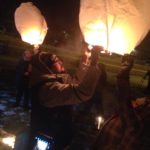 The Mat-Su Task Force had its beginnings with a community meeting at MYHOUSE in Wasilla. There had been Spectrum articles addressing the opioid epidemic in the Valley that appeared in the Frontiersman Newspaper. MYHOUSE received a number of phone calls responding to those articles and those community members were inquiring about, “What can we do to address the opioid problem?”
The Mat-Su Task Force had its beginnings with a community meeting at MYHOUSE in Wasilla. There had been Spectrum articles addressing the opioid epidemic in the Valley that appeared in the Frontiersman Newspaper. MYHOUSE received a number of phone calls responding to those articles and those community members were inquiring about, “What can we do to address the opioid problem?”A meeting was announced and held at MYHOUSE, with standing room only. The meeting was very emotional with personal testimony that was heartbreaking and in short, gut wrenching. In fact, not everyone had a chance to share due to how many people were in attendance. We felt that initial meeting was very much like early meetings addressing youth homelessness. It left us reeling. Again, the testimonies were very tragic and painful. We decided we needed to have more meetings to continue this vital discussion, and more importantly, begin to capture those emotions and put them into action to end opioid abuse.
We began having meetings every two weeks due to the high level of interest and the desperate need of seeking a solution to the opioid epidemic. Early in the process, the Mat-Su Health Foundation wanted to work with MYHOUSE to host a public forum with local speakers and a panel discussion. Shortly after that public forum, the State was beginning to form a Statewide Opioid Task Force. Two members of our task force were asked to join their task force.
Then, we were asked to select our top five priorities and send them onto the State. At the same time the task force began to invite speakers to raise awareness of the epidemic, gain more knowledge and to assist the task force in seeking solutions with that information. That valuable component of guest speakers still is a very important part of each and every task force meeting.
Eventually, we felt we had caught up with identifying our top 5 priorities, developing a fully addressed strategic plan, and forming subcommittees. So, we began to meet once a month. One of our earliest successes was a resource list that was created and expanded to assist community members seeking help for family members and friends. During this time period, eight women from Alaska visited with Senator Dan Sullivan in Washington D.C. during a ‘Celebrating Recovery’ rally on the mall. The Senator was so moved, he cleared his calendar that day and spent the day with those courageous women speaking about their own personal recovery.
That meeting put into motion the Alaska Wellness Summit held at the Glen Massey Theater. That summit had National, State and local speakers with breakout sessions. MYHOUSE played a small part in the planning with Senator Dan Sullivan’s Wasilla Office. Senator Lisa Murkowski was in attendance, Rep. Don Young attended via teleconference, along with Federal Department personal, the Federal Surgeon General, our State Public Health Chief Medical Officer, many other State officials and Alaskans from across the State.
MYHOUSE was honored to have most of all those dignitaries for breakfast in the ‘Gathering Grounds Cafe’ before the summit began. It was a ‘full house at MYHOUSE!’ The task force started making ‘field trips’ to investigate possible detox/treatment centers and many articles were printed in Frontiersman Newspaper about those excursions and coverage of our meetings. Then, the Mayor of Wasilla offered us the City Hall Assembly Chamber for our meetings. The room is full every meeting.
The task force is very fortunate to have individuals that continually reach out seeking solutions. Members attend conferences as guest speakers themselves and are part of panel discussions. There have been Statewide events created by task force members. One of those events was a Statewide Candlelight Vigil, January 10th remembering all those lost to fatal overdoses. And that vigil will be an annual event. Another event is training for administering Narcan kits to reverse overdoses due to opioids. Also, we are very excited about the ‘Lazarus Project.’ It is an ambulatory, non-narcotic detox model, which was developed by task force members, agencies and groups coming together and working collaboratively. The epidemic is going to end due to the dedication and commitment of these task force members, agencies and groups.
The task force has been contacted by other Alaskan communities to assist them in forming their own opioid task forces. There are other communities that have coalitions addressing alcohol and drug problems. Yet, the Mat-Su Opioid Task Force was the only task force with a vision of specifically ending opioid abuse. Now, we are battling this epidemic even more so, due to other Alaskan communities working together.
You can join us in the good fight too!
Michael P. Carson, V.P., MYHOUSE and Recovery Specialist/Chair of Mat-Su Opioid Task Force